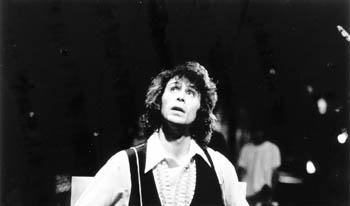![[Metroactive Movies]](/movies/gifs/movies468.gif)
[ Movies Index | Show Times | Silicon Valley | Metroactive Home | Archives ]

Hero Actor: Jeremy Sisto won a Cinequest award for his performance in 'The Movie Hero.' Quest Best Cinequest wraps 2003 with awards and attendance boost IT SEEMS as if, every year, Cinequest becomes more and more high-powered--if the cell phones alone are counted. In the bathroom at the Camera 3, I saw one player trying to pee and talk to his agent at the same time. The economic downtown did nothing to dampen the proceedings. The festival finished its fortnight with a reported 17 percent increase in ticket sales from last year--for an attendance of 53,700, nearly 4,000 more bodies than 2002's edition. Just one sample day at the festival--Friday, March 7: First, I sat in on Lee Miller's riveting but chilling documentary Real Time. Miller, a professor at Cupertino's Cogswell College, took his filmmaking class into the California Youth Authority's O.H. Klose school for hard-case juvenile offenders to teach them filmmaking. If any of these behind-bars youths survive what once was a 60 percent recidivism rate before the state of California cut the art and music program (it's 90 percent now), it's clear they ought to be in pictures. Miller said afterward, at the Q-and-A session, that one of the stars in Real Time is now a high-powered sales closer, "and he makes more money than I do." Later at Cinequest's DXD panel, Stuart English, Panasonic's vice president of Marketing, demonstrated some of the newest products: portable digital projectors that cost $25,000, along with the high-end $100,000 digital projector. As English admitted from the stage, the torture test of digital projection is a full-sized cinema screen. In the current models, Stuart said, "The whites are perfectly white; the blacks aren't quite right yet. In six months to a year, it'll be equal [to] or better than 35mm film." That remains to be seen; what's visible today is very clearly defined but still inferior to the velvety depth of 35mm. However, the vast difference in cost, convenience and portability makes the sacrifice worthwhile for many filmmakers. Moreover, the image is only one part of a film-watching experience: If you come out of a film only talking about the photography, something essential was missing. Afterward, in front of the San José Repertory Theater, a few dancers rallied for a late-night screening of the shot-on-digital documentary Confessions of a Burning Man. I bailed to go see William H. Macy receive the Maverick Spirit Award. Macy, nattily clad in a first-rate dark suit, came up in the elevator with a telephone jack in his ear, talking to his wife as he walked up to the stage. The self-proclaimed "workaday actor" addressed a fond crowd at the rooftop auditorium at the new Fourth Street Parking Lot of the Future. He praised his mentor David Mamet and recalled his unPleasantville childhood in the 1950s: "If Ward had been absent and June had been drunk, it would have been my life." The awards for the best of the festival include Black Tape: A Tehran Diary, by Fariborz Kamkari, which deservedly won the Maverick Spirit Award. Other awards were handed out for Expecting (Best First Feature Narrative Film), Lovers and Leavers (Best Narrative Feature Film); the Swedish between-life-and-death thriller The Invisible (Best Directorial Debut) and The Movie Hero (a special jury award for Jeremy Sisto's lead acting). The Audience Choice awards for best feature and best documentary went to Crazy Jones and Our House, respectively.
Send a letter to the editor about this story to letters@metronews.com. [ Silicon Valley | Metroactive Home | Archives ]
|
From the March 13-19, 2003 issue of Metro, Silicon Valley's Weekly Newspaper.
Copyright © Metro Publishing Inc. Metroactive is affiliated with the Boulevards Network.
For more information about the San Jose/Silicon Valley area, visit sanjose.com.